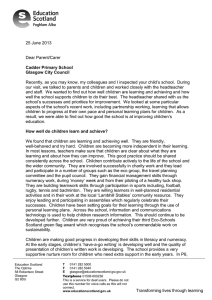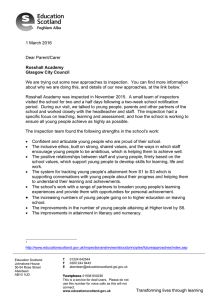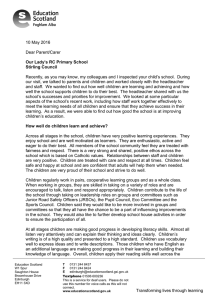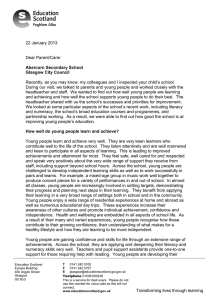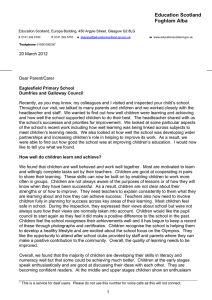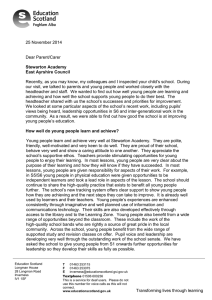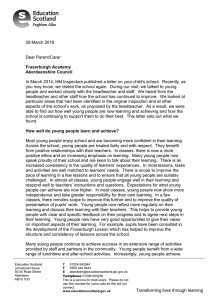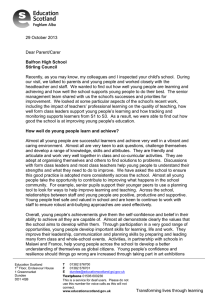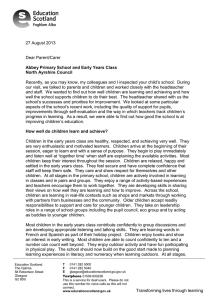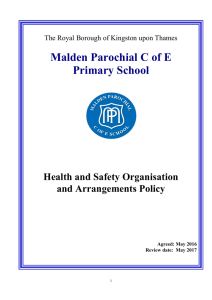19 May 2015 Dear Parent/Carer
advertisement
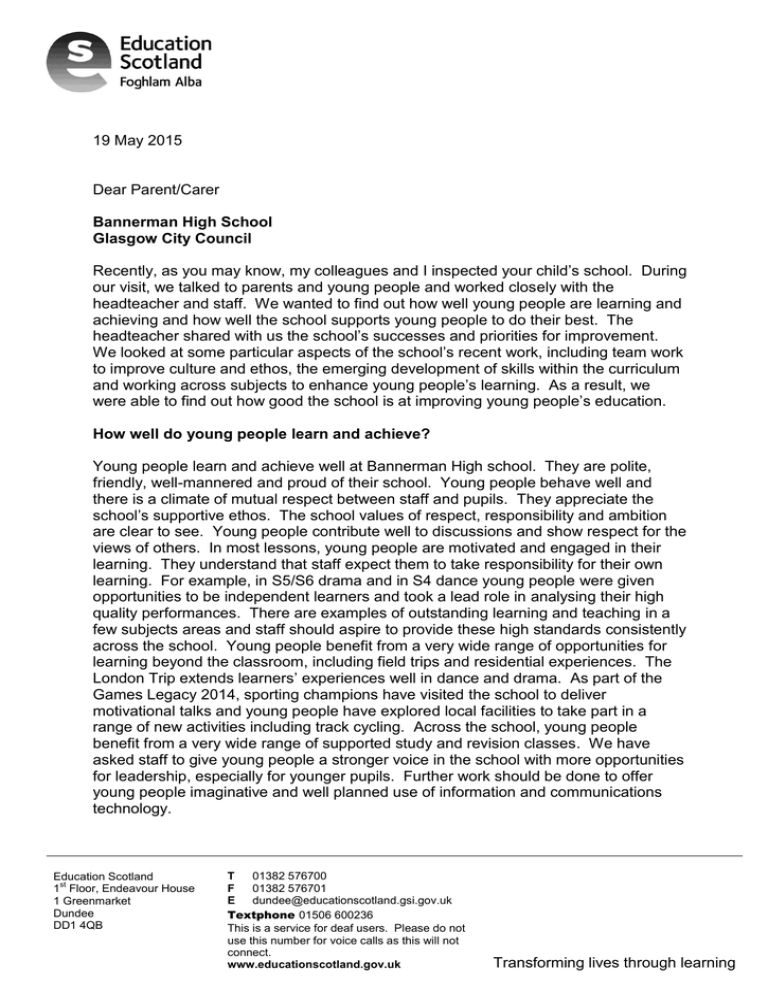
19 May 2015 Dear Parent/Carer Bannerman High School Glasgow City Council Recently, as you may know, my colleagues and I inspected your child’s school. During our visit, we talked to parents and young people and worked closely with the headteacher and staff. We wanted to find out how well young people are learning and achieving and how well the school supports young people to do their best. The headteacher shared with us the school’s successes and priorities for improvement. We looked at some particular aspects of the school’s recent work, including team work to improve culture and ethos, the emerging development of skills within the curriculum and working across subjects to enhance young people’s learning. As a result, we were able to find out how good the school is at improving young people’s education. How well do young people learn and achieve? Young people learn and achieve well at Bannerman High school. They are polite, friendly, well-mannered and proud of their school. Young people behave well and there is a climate of mutual respect between staff and pupils. They appreciate the school’s supportive ethos. The school values of respect, responsibility and ambition are clear to see. Young people contribute well to discussions and show respect for the views of others. In most lessons, young people are motivated and engaged in their learning. They understand that staff expect them to take responsibility for their own learning. For example, in S5/S6 drama and in S4 dance young people were given opportunities to be independent learners and took a lead role in analysing their high quality performances. There are examples of outstanding learning and teaching in a few subjects areas and staff should aspire to provide these high standards consistently across the school. Young people benefit from a very wide range of opportunities for learning beyond the classroom, including field trips and residential experiences. The London Trip extends learners’ experiences well in dance and drama. As part of the Games Legacy 2014, sporting champions have visited the school to deliver motivational talks and young people have explored local facilities to take part in a range of new activities including track cycling. Across the school, young people benefit from a very wide range of supported study and revision classes. We have asked staff to give young people a stronger voice in the school with more opportunities for leadership, especially for younger pupils. Further work should be done to offer young people imaginative and well planned use of information and communications technology. Education Scotland st 1 Floor, Endeavour House 1 Greenmarket Dundee DD1 4QB T 01382 576700 F 01382 576701 E dundee@educationscotland.gsi.gov.uk Textphone 01506 600236 This is a service for deaf users. Please do not use this number for voice calls as this will not connect. www.educationscotland.gov.uk Transforming lives through learning Across the school, young people are achieving a very broad range of skills for life and work. Increasing numbers of young people are engaging actively and participating in sports competitions, artistic shows, performances and exhibitions. A significant number of young people achieve Saltire awards for their contribution as school buddies. They enhance their communication skills as they work with a variety of groups, including their peers and younger children. Most young people across the school are eager to get involved and make a difference to the lives of others. They do this through school-based fundraising events to support various local and international charities. The school has developed and maintained education links with partners in Malawi and raises funds for each visit made by staff and pupils. They also provide financial support for visiting pupils from Malawi. Young people improved their environment and achieved a John Muir Trust award through this work. They gain skills in performance through their involvement in various music and drama groups and from high quality public performances such as the annual school show. Achieving these varied skills helps young people prepare well for the world of work. Young people with additional learning needs, including those working in the Learning and Communication Resource (LCR), progress well to a positive destination such as work or college. The school is continuing to develop its tracking of all young people’s achievements to ensure they all benefit from a broad and varied education. From S1 to S3, most young people are making good progress across all curriculum areas and in literacy and numeracy. Overall from S4 to S6, young people are making very good progress in National Qualifications. By S4, increasing numbers of young people are attaining a literacy and numeracy award at National 4 and National 5 level. By S6, young people build well on their previous levels of attainment. Almost all young people are successful in moving on to a positive destination such as employment, training or further learning on leaving school. Staff should continue to develop the school’s tracking system to develop young people’s understanding of how well they are achieving and the next steps they can take to improve. How well does the school support young people to develop and learn? In most lessons, teachers set tasks and activities at the right level to meet the learning needs of young people. The pace of learning is suitable in most lessons. In the best examples, staff are aware of the specific needs of young people and spend extra time nurturing those who require it to ensure their chances of success. For example in social studies, lessons are well planned with appropriate opportunities for active learning and challenging activities. Across the school in a few lessons teachers did not provide enough support or challenge for young people. The school has effective approaches to support the pastoral needs of all young people. During tutor time all young people benefit from helpful opportunities to discuss their progress and consider their next steps with pupil support staff who know them very well. Pupil support assistants play a strong role in supporting young people to improve and achieve. The school has strong links with partner agencies such as social workers and a variety of health professionals who help to provide young people and their families with the right help at the right time. The school’s curriculum is based on ambition for young people and on Curriculum for Excellence principles. Staff aim to provide relevant experiences for young people which equip them for life beyond school. There is an increasing focus on employability 2 skills. We have asked the school to develop the curriculum from S1 to S3 to ensure that young people are developing their skills progressively and understand their relevance. At these stages young people have opportunities to learn through a broad range of subjects and a range of opportunities for personal achievement. The curriculum includes learning across subjects on themes such as China Week where learners study aspects of Chinese history, culture and language. The Mini Baccalaureate for S3 provides an opportunity for young people to develop a range of analysis and creativity skills. Staff across the school plan effectively to develop young people’s literacy, numeracy and health and wellbeing. The school is continuing to develop the curriculum with a wide range of partners including local businesses, former pupils and parents. This partnership working is increasing young people’s awareness of options about possible future pathways and the range of skills they require to be successful in their chosen career. The school now needs to formalise arrangements with these partners to develop a better planned approach for their contribution to curriculum development. How well does the school improve the quality of its work? The headteacher is very well respected by the school community. Staff, pupils and parents speak positively about how she encourages them to improve and become more involved in leading aspects of school life. Senior managers form a united, open team, who work well together to improve the work of the school and outcomes for young people. As a team they communicate a clear and consistent message. Staff contribute to the school’s very positive ethos. They work well together, develop ideas and play a key role in school improvement. They participate in learning teams to enhance their knowledge and understanding of the latest and best educational practice. They contribute well to school and departmental improvement plans. Staff work with senior leaders very regularly to analyse examination results with the aim of ensuring all young people attain as highly as possible. Faculty heads and senior leaders visit classes to observe and support learning and teaching. We have asked them to ensure that these visits lead to more consistently high-quality learning and teaching across the school. Parents and partner organisations are beginning to play a bigger part in school improvement. This work should continue to be developed further. Overall, the school is well placed to continue to improve. This inspection found the following key strengths: Polite well-mannered and welcoming young people who are proud of their school. A headteacher who is held in high regard and who promotes lifelong learning and leadership across the school. Partnership working that improves outcomes for young people who require additional support. Young people’s achievements, particularly in national qualifications at the upper stages. The strong performance in the expressive arts including dance. 3 We discussed with staff and Glasgow City Council how they might continue to improve the school. This is what we agreed with them. Continue to develop the broad general education for young people from S1 to S3. Ensure self-evaluation is used consistently across the school to improve young people’s experiences further. What happens at the end of the inspection? We are satisfied with the overall quality of provision. We are confident that the school’s self-evaluation processes are leading to improvements. As a result, we will make no further visits in connection with this inspection. As part of its arrangements for reporting to parents on the quality of education, Glasgow City Council will inform parents about the school’s progress. Aileen Monaghan HM Inspector Additional inspection evidence, such as details of the quality indicator evaluations, for your school can be found on the Education Scotland website at http://www.educationscotland.gov.uk/inspectionandreview/reports/school/primsec/Ban nermanHighSchoolGlasgowCity.asp If you would like to receive this letter in a different format, for example, in a translation please contact the administration team on the above telephone number. If you want to give us feedback or make a complaint about our work, please contact us by telephone on 0141 282 5000, or e-mail: complaints@educationscotland.gsi.gov.uk or write to us addressing your letter to the Complaints Manager, Denholm House, Almondvale Business Park, Livingston EH54 6GA. 4
